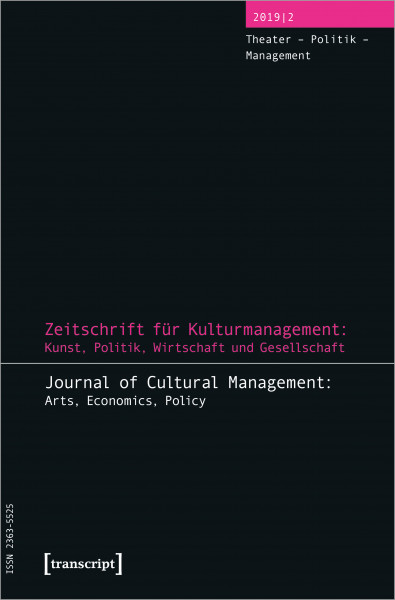Research Article
Theatre leadership from a communication perspective

Abstract
Although communication is inherent in leadership, it has not yet been explicitly investigated in cultural management research. This explorative study addresses leadership in theatres from a communication perspective. It is based on the theoretical approaches of communicative leader-member-exchange and aesthetic leadership. In 37 interviews, first- and second-level managers in German theatres show a high level of awareness for the importance of their communication. Nevertheless, internal communication appears to be weakly structured in terms of strategic organizational communication, even though it seems to become more systematic. The integration of conflicting organizational areas (especially the aesthetic, technical/workshops and administration/financial area) is regarded as a decisive communicative leadership-task both in short-term (moderating, negotiating) and in long-term (permanent dialogue/ fostering mutual understanding) perspectives. Furthermore, the results contribute to refine the approach developed and point ways for future research on leadership communication in theatres.
Keywords
2019 (2)
Theatre – Politics – Management

Related Articles
Journal of Cultural Management 2017 (2)
Case Study
Peter BUSS: Fundraising. Grundlagen, System und strategische Planung
Journal of Cultural Management 2015 (1)
Book Review
Democratization of Culture or Cultural Democracy? Theater in Germany and England
Journal of Cultural Management and Cultural Policy
Research Article
Yearbook for Culture Management 2010
Essay
Der ‚Blick hinter die Fassade‘
Ansätze einer Tiefenanalyse von Evaluationen im MuseumssektorJournal of Cultural Management 2016 (2)
Research Article
Journal of Cultural Management 2015 (1)
Book Review
© 2026, Journal of Cultural Management and Cultural Policy
Keywords
- Aesthetics
- Higher Education
- Cultural Diplomacy and Foreign Cultural Policy
- Occupation
- Career and Professional Role
- Audience Development
- Audience Studies and Visitor Studies
- Visitor Motivations
- Business
- Covid Pandemic
- Democracy
- Digitalization
- Diversity
- Third Sector
- Empirical Aesthetics
- Development
- Ethics
- Evaluation
- Field Theory
- Festival
- Film
- Federalism
- Community Arts
- Societal Change
- Ideology
- Staging
- Career
- Communication
- Concert
- Creative Industries
- Creativity
- Crisis
- Culture
- arts organizations, cultural organizations
- Cultural Participation
- Cultural Change
- Fincancing The Arts
- Cultural Promotion Law
- Cultural History
- Cultural Management
- Cultural Economy
- Cultural Organizations
- Art Education
- Cultural Policy
- Cultural Production
- Cultural Sociology
- Art Education
- Cultural Understanding
- Arts Administration
- Cultural Industry
- Cultural Sciences
- Art
- Art Field
- Arts Research
- Artists
- Artistic Research
- Artistic Reputation
- Arts Management
- Arts Organizations
- Art education
- Arts Marketing
- Arts Administration
- Curating
- Leadership
- Literature
- Advocacy
- Management
- Marketing
- Market
- Media
- Methods Development
- Mexico
- Monumentalizing
- Museum
- Music
- Non-Visitor Studies
- Opera
- Orchestra
- Organization
- Political Expression
- Post-truth Politics
- Professional Role
- Audience
- Audience Development
- Law
- Government
- Role
- Socially Engaged Art
- Social Cohesion
- Social Change
- Social Cohesion
- Non-visitor Socio-demographics
- Socioculture
- State
- Symbolic capital
- Dance
- Participatory Justice
- Theatre
- Theatre Governance
- Theory Development
- Tourism
- Transformation
- Survey
- Entrepreneurship
- Urbanism
- Civil Society


